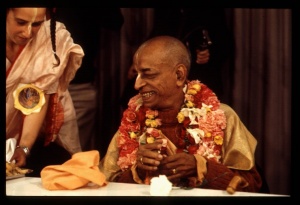SB 9.10.26: Difference between revisions
m (1 revision(s)) |
(Vanibot #0018 edit: make synonym terms in Sanskrit italic in SB - Vanisource) |
||
| Line 1: | Line 1: | ||
{{info | {{info | ||
|speaker= | |speaker=Mandodari, wife of Rāvaṇa | ||
|listener= | |listener=Rāvaṇa's dead body | ||
}} | }} | ||
[[Category:Srimad-Bhagavatam - Canto 09 Chapter 10]] | |||
[[Category:Bhagavatam Verses Spoken by Mandodari, wife of Ravana - Vanisource|091026]] | |||
<div style="float:left">'''[[Srimad-Bhagavatam]] - [[SB 9|Ninth Canto]] - [[SB 9.10: The Pastimes of the Supreme Lord, Ramacandra|Chapter 10: The Pastimes of the Supreme Lord, Rāmacandra]]'''</div> | |||
<div style="float:right">[[File:Go-previous.png|link=SB 9.10.25]] '''[[SB 9.10.25]] - [[SB 9.10.27]]''' [[File:Go-next.png|link=SB 9.10.27]]</div> | |||
{{RandomImage}} | |||
==== TEXT 26 ==== | ==== TEXT 26 ==== | ||
<div | <div class="verse"> | ||
hā hatāḥ sma vayaṁ nātha | :hā hatāḥ sma vayaṁ nātha | ||
loka-rāvaṇa rāvaṇa | :loka-rāvaṇa rāvaṇa | ||
kaṁ yāyāc charaṇaṁ laṅkā | :kaṁ yāyāc charaṇaṁ laṅkā | ||
tvad-vihīnā parārditā | :tvad-vihīnā parārditā | ||
</div> | </div> | ||
| Line 17: | Line 22: | ||
==== SYNONYMS ==== | ==== SYNONYMS ==== | ||
<div | <div class="synonyms"> | ||
''hā''—alas; ''hatāḥ''—killed; ''sma''—in the past; ''vayam''—all of us; ''nātha''—O protector; ''loka-rāvaṇa''—O husband, who created the crying of so many other people; ''rāvaṇa''—O Rāvaṇa, one who can cause crying of others; ''kam''—unto whom; ''yāyāt''—will go; ''śaraṇam''—shelter; ''laṅkā''—the state of Laṅkā; ''tvat-vihīnā''—being bereft of your good self; ''para-arditā''—being defeated by the enemies. | |||
</div> | </div> | ||
| Line 24: | Line 29: | ||
==== TRANSLATION ==== | ==== TRANSLATION ==== | ||
<div | <div class="translation"> | ||
O my lord, O master! You epitomized trouble for others, and therefore you were called Rāvaṇa. But now that you have been defeated, we also are defeated, for without you the state of Laṅkā has been conquered by the enemy. To whom will it go for shelter? | O my lord, O master! You epitomized trouble for others, and therefore you were called Rāvaṇa. But now that you have been defeated, we also are defeated, for without you the state of Laṅkā has been conquered by the enemy. To whom will it go for shelter? | ||
</div> | </div> | ||
| Line 31: | Line 36: | ||
==== PURPORT ==== | ==== PURPORT ==== | ||
<div | <div class="purport"> | ||
Rāvaṇa's wife Mandodarī and the other wives knew very well how cruel a person Rāvaṇa was. The very word "Rāvaṇa" means "one who causes crying for others." Rāvaṇa continuously caused trouble for others, but when his sinful activities culminated in giving trouble to Sītādevī, he was killed by Lord Rāmacandra. | Rāvaṇa's wife Mandodarī and the other wives knew very well how cruel a person Rāvaṇa was. The very word "Rāvaṇa" means "one who causes crying for others." Rāvaṇa continuously caused trouble for others, but when his sinful activities culminated in giving trouble to Sītādevī, he was killed by Lord Rāmacandra. | ||
</div> | </div> | ||
__NOTOC__ | |||
<div style="float:right; clear:both;">[[File:Go-previous.png|link=SB 9.10.25]] '''[[SB 9.10.25]] - [[SB 9.10.27]]''' [[File:Go-next.png|link=SB 9.10.27]]</div> | |||
__NOTOC__ | |||
__NOEDITSECTION__ | |||
Revision as of 09:30, 1 December 2017

A.C. Bhaktivedanta Swami Prabhupada
TEXT 26
- hā hatāḥ sma vayaṁ nātha
- loka-rāvaṇa rāvaṇa
- kaṁ yāyāc charaṇaṁ laṅkā
- tvad-vihīnā parārditā
SYNONYMS
hā—alas; hatāḥ—killed; sma—in the past; vayam—all of us; nātha—O protector; loka-rāvaṇa—O husband, who created the crying of so many other people; rāvaṇa—O Rāvaṇa, one who can cause crying of others; kam—unto whom; yāyāt—will go; śaraṇam—shelter; laṅkā—the state of Laṅkā; tvat-vihīnā—being bereft of your good self; para-arditā—being defeated by the enemies.
TRANSLATION
O my lord, O master! You epitomized trouble for others, and therefore you were called Rāvaṇa. But now that you have been defeated, we also are defeated, for without you the state of Laṅkā has been conquered by the enemy. To whom will it go for shelter?
PURPORT
Rāvaṇa's wife Mandodarī and the other wives knew very well how cruel a person Rāvaṇa was. The very word "Rāvaṇa" means "one who causes crying for others." Rāvaṇa continuously caused trouble for others, but when his sinful activities culminated in giving trouble to Sītādevī, he was killed by Lord Rāmacandra.